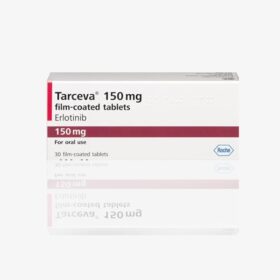- Your cart is empty
- Continue Shopping

Product
Introduction: Cantret, with its active ingredient Altretamine, is a medication that falls under the category of antineoplastic agents. This drug is primarily used in the treatment of certain types of ovarian cancer that have not responded well to other treatments. Altretamine is a synthetic compound designed to inhibit the growth and spread of cancer cells, providing a targeted approach to managing ovarian cancer.
Drug Class: Cantret belongs to the class of drugs known as alkylating agents. Alkylating agents are chemotherapy drugs that work by attaching alkyl groups to DNA, preventing cancer cells from dividing and growing. In the case of Cantret, the unique chemical structure of Altretamine allows it to exert its anticancer effects specifically against ovarian cancer cells.
Indications: The primary indication for Cantret is the treatment of advanced ovarian cancer. Specifically, it is used when other forms of chemotherapy have proven ineffective in controlling the progression of the disease. Cantret may be prescribed as a standalone treatment or in combination with other chemotherapy agents, depending on the specific characteristics of the patient’s cancer.
Mechanism of Action: Altretamine, the active ingredient in Cantret, works by disrupting the DNA within cancer cells. This disruption occurs through the alkylation of DNA, where Altretamine forms covalent bonds with the DNA strands. This process interferes with the DNA’s ability to replicate and transcribe, ultimately leading to the inhibition of cancer cell division and growth. Altretamine’s selective action on cancer cells minimizes its impact on healthy cells, reducing the severity of side effects.
Dosage and Administration: The dosage of Cantret is individualized based on factors such as the patient’s weight, overall health, and the specific characteristics of the ovarian cancer being treated. Generally, Cantret is administered orally in the form of capsules, with each capsule containing 50 mg of Altretamine.
The typical dosage regimen may involve taking Cantret on specific days of a treatment cycle, with rest periods in between to allow the body to recover. It is crucial for patients to strictly adhere to the prescribed dosage and schedule, as deviations may impact the drug’s effectiveness and increase the risk of side effects.
Medical professionals closely monitor patients receiving Cantret, adjusting the dosage as needed to optimize the therapeutic outcome while minimizing adverse effects. Patients are advised to follow their healthcare provider’s instructions diligently and report any unusual symptoms or concerns promptly.
Effectiveness: The effectiveness of Cantret in the treatment of ovarian cancer has been demonstrated in clinical studies. Altretamine has shown efficacy in cases where other chemotherapy options have failed to provide satisfactory results. The drug’s mechanism of action, specifically targeting ovarian cancer cells, has contributed to its success in managing advanced ovarian cancer.
However, individual responses to Cantret can vary, and the overall effectiveness depends on various factors, including the stage of cancer, the presence of specific genetic markers, and the patient’s overall health. As with any cancer treatment, the healthcare team closely monitors the patient’s progress through regular assessments, imaging studies, and blood tests to evaluate the drug’s effectiveness and adjust the treatment plan if necessary.
Side Effects: While Cantret can be effective in treating ovarian cancer, like any chemotherapy medication, it may cause side effects. Common side effects include nausea, vomiting, fatigue, and changes in blood cell counts. Patients may also experience gastrointestinal symptoms such as diarrhea or constipation.
Some less common but potentially serious side effects may include allergic reactions, neuropathy, and bone marrow suppression. It is essential for patients to promptly report any unusual or severe side effects to their healthcare provider to receive appropriate management.
The healthcare team will monitor patients closely for potential side effects, adjusting the treatment plan or providing supportive care as needed. Proactive management of side effects helps improve the patient’s quality of life during cancer treatment.
Contraindications: While Cantret is effective in many cases, it may not be suitable for everyone. Contraindications to the use of Cantret include known hypersensitivity to Altretamine or any of the capsule’s components. Additionally, individuals with severely impaired bone marrow function or significant pre-existing neurologic conditions may not be suitable candidates for Cantret therapy.
Before initiating Cantret treatment, healthcare providers conduct a thorough assessment of the patient’s medical history, current health status, and any potential contraindications. It is crucial for patients to inform their healthcare team of any pre-existing conditions, allergies, or medications they are currently taking to ensure the safe and effective use of Cantret.
In conclusion, Cantret (Altretamine) 50 mg Capsules represent a valuable option in the management of advanced ovarian cancer. As an alkylating agent with a unique mechanism of action, Cantret provides targeted therapy to inhibit the growth of cancer cells. While it has demonstrated effectiveness, its use is accompanied by potential side effects, and individual responses may vary. Close collaboration between healthcare providers and patients is essential to optimize the benefits of Cantret while managing any associated challenges. Always consult with a healthcare professional for personalized information and guidance regarding the use of Cantret for a specific medical condition.














Reviews
There are no reviews yet.